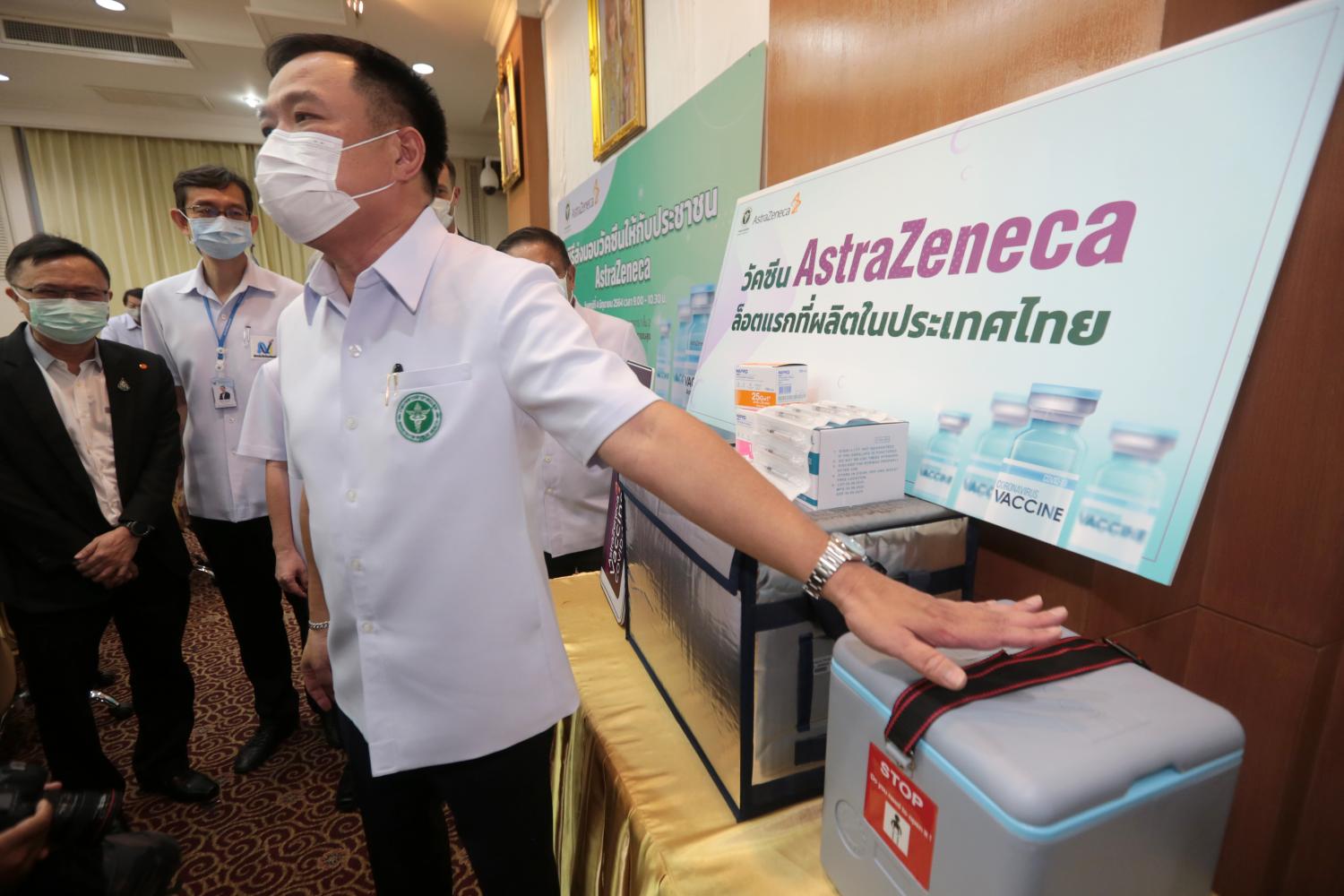
With assurances from AstraZeneca and Siam Bioscience that 1.8 million Covid-19 vaccine doses will be delivered in time for Monday -- the planned date for the launch of the kingdom's mass inoculation campaign -- plus an additional six million doses by the end of the month, the Prayut Chan-o-cha government may feel it can breathe a sigh of relief.
According to the original inoculation plan, AstraZeneca is to deliver 10 million doses per month until December. A supply of alternative vaccines will then be available. Also, the government has ordered 11 million additional Sinovac vaccine doses to be placed on stand-by in case AstraZeneca misses its delivery schedule. This is to ensure there are vaccines available. The Chulabhorn Royal Academy (CRA) has also landed a deal with Sinopharm for one million doses.
It was previously reported that Thailand had to share the 1.8 million doses with other countries that had ordered the vaccine. But it was confirmed yesterday the doses would stay in Thailand.
Before we rejoice, bear in mind that the European Union has slapped AstraZeneca with a huge fine for shortfalls in vaccine delivery.
The past few months have seen mounting pressure on the government, including Gen Prayut, over concerns AstraZeneca might not be able to deliver its jabs on time. Thailand lags behind other countries, with a low vaccination rate, while new waves of outbreaks have hit hard. A partial lockdown has caused an economic slump, with many people experiencing unemployment and lost income.
The hiccup in the campaign is a bad omen as Thailand depends heavily on tourism revenue. If it can't promptly achieve herd immunity, hopes for a reopening will dim.
Vaccines for the June 7 campaign could partially ease the pressure. But distribution is a major challenge.
The big question for the government is: How can the vaccine doses be efficiently managed and distributed to 77 provinces during the rollout?
A good sign is that the government seems to be paying heed to recommendations made by various groups, including the Rural Doctors Club, to revise its vaccination plan. The club suggested that the government send the vaccine doses to dark-red zones first instead of "first come, first served".
According to the revised plan, people in the virus' epicentres, particularly Bangkok and its surrounding neighbours, as well as some strategic provinces like Phuket, which has already completed 50% of its first-jab target, will be the priority.
Besides, it is likely that the distribution will be more flexible, based on a week by week, not monthly, review. Priority groups include the elderly, people in education circles and workers in key economic sectors.
The Public Health Ministry has assured that vaccine distribution will be inclusive and fair, with all provinces getting their share. Consideration will be given to the vaccine per population ratio and infection situation, for instance, meaning the provinces with severe outbreaks will get more jabs. But that's easier said than done.
The question is: How can we make the best use of the currently limited amount of vaccine doses? Not to mention that vaccines, as we know, have become a political issue.
It has been more than a year since the government began battling Covid-19, and most people are not confident in its vaccine management capabilities. There have been surges of new clusters in factories and construction camps. The government has tried to downplay the problem, but it is evident that testing and active case finding are still minimal -- even as new variants are posing a great challenge.
It is important that the government ensures there is no disparity in vaccine distribution. Cronyism that allows people with connections to be unjustifiably placed ahead in the queue to get a jab is not acceptable. The fact that vaccine demand is on the rise means provinces want to return to normalcy. This also means mounting pressure on the government.
Now several local administrative agencies have attempted to secure their own supplies, but the government cannot cater to the rising demand. Some agencies with the financial means have gone so far as to ask to buy vaccine doses directly from the CRA rather than waiting for the government, while those without money have been left out in the cold.
Taxpayers are frustrated that they cannot have access to vaccines.
The government is well aware that a vaccine race could become a political issue. It has put the brakes on local agencies' attempts to secure their own supplies, citing the need to amend regulations.
But the limited AstraZeneca supplies mean the government has no choice but to cancel prioritising certain groups. Or, it may have to provide the elderly with the Sinovac vaccine, which could create confusion since it previously explained that this Chinese product is not suitable for people over the age of 60. Such an information flip-flop is not helpful.
At least two provinces, including Lampang, which is ranked as one of the provinces with the highest vaccine registration rates, face vaccine cancellation. In Prachuap Khiri Khan's Hua Hin, only 930 out of 5,800 people who registered for the June 7-11 rollout will get jabs. It's been reported that frustration is running high among those who will miss out on the vaccine on D-Day. More complaints will be heard as several provinces are facing vaccine cuts.
The government has been scolded over the past few months for its poor vaccine management, which now comes with political factors, communication failures and confusing registration apps. On top of that, some of the vaccine doses were grabbed by politicians. This has caused conflict among their colleagues who want that sort of priority for their own constituents.
The government has to learn from its past mistakes and ensure that vaccine distribution is fair and transparent. On top of that, there must be no more foul play.
